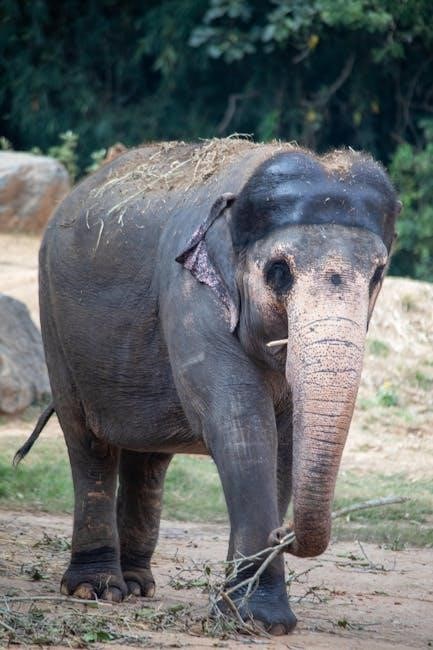the jungle upton sinclair pdf
Upton Sinclair’s The Jungle, published in 1906, is a groundbreaking novel exposing the harsh realities of the meatpacking industry and immigrant life in Chicago. Its vivid portrayal of exploitation and poor working conditions led to significant legislative reforms, including the Pure Food and Drug Act. The novel remains a powerful critique of capitalism and the illusion of the American Dream. Today, The Jungle is widely available in PDF format, ensuring its accessibility to modern readers.
1.1 Historical Context of the Novel
The Jungle, written by Upton Sinclair in 1906, is set against the backdrop of early 20th-century America, a time of rapid industrialization and mass immigration. The novel reflects the harsh realities faced by immigrant workers in the meatpacking industry of Chicago, where exploitation and unsafe working conditions were rampant. Sinclair, a journalist and socialist, aimed to expose the injustices of capitalism and advocate for workers’ rights. Drawing from his own investigations, he depicted the struggles of Lithuanian immigrants like Jurgis Rudkus, who sought the American Dream but found only poverty and despair. The novel’s vivid descriptions of the industry’s practices shocked the public, leading to reforms such as the Pure Food and Drug Act and the Federal Meat Inspection Act. This historical context underscores Sinclair’s role as a muckraker, using literature to drive social change.
1.2 Upton Sinclair’s Purpose and Themes
Upton Sinclair wrote The Jungle primarily to critique the exploitation of immigrant workers in capitalist America and to advocate for socialism. His vivid portrayal of the meatpacking industry’s horrors revealed the harsh realities of wage slavery, poor working conditions, and the erosion of the American Dream. Sinclair aimed to provoke public outrage and push for systemic change. Themes such as Social Darwinism, the struggle for survival, and the illusion of upward mobility are central to the novel. Through Jurgis Rudkus’s journey, Sinclair exposed the dehumanizing effects of industrialization and championed labor rights, hoping to inspire reform and challenge the status quo. The novel remains a powerful indictment of unchecked capitalism and a call for social justice.
The Setting and Plot
Set in early 20th-century Chicago, The Jungle portrays the brutal realities of the meatpacking industry and the struggles of immigrant workers, highlighting their exploitation and hardships.
2.1 Life in the Meatpacking Industry of Chicago
In Upton Sinclair’s The Jungle, the meatpacking industry of Chicago is depicted as a brutal and exploitative system. Workers, including Jurgis and his family, toil in unsanitary conditions, exposed to disease and danger. The novel vividly describes the processing of diseased animals and the lack of regulation, which endangered both workers and consumers. Sinclair highlights the physical and emotional toll on laborers, who endure long hours, low wages, and minimal rights. The industry’s disregard for worker safety and well-being reflects the broader exploitation of immigrants seeking a better life. These revelations shocked the public, leading to widespread outrage and calls for reform. The harsh realities portrayed in The Jungle remain a stark critique of industrial capitalism’s darker side.
2.2 The Struggle of Immigrant Families
In The Jungle, Upton Sinclair vividly portrays the struggles of immigrant families in early 20th-century Chicago. Jurgis Rudkus and his family, like many others, arrive with hope for a better life but are met with poverty, exploitation, and despair. The novel highlights the harsh realities of overcrowded housing, inadequate healthcare, and the constant threat of disease. Immigrant families face cultural isolation and language barriers, further exacerbating their difficulties. Sinclair also explores the moral and emotional toll of poverty, as families are forced to make impossible choices to survive. Through their story, he exposes the systemic failures that trap immigrants in cycles of poverty, shedding light on the human cost of industrialization and the shattered illusions of the American Dream.

Major Themes in The Jungle
The Jungle explores themes of Social Darwinism, the illusion of the American Dream, and the exploitation of workers, highlighting the struggle for social justice and equality.
3.1 Social Darwinism and Survival of the Fittest
Social Darwinism, a concept popular in the late 19th and early 20th centuries, is a central theme in The Jungle. Sinclair critiques this ideology, which applies Darwin’s “survival of the fittest” to society, justifying exploitation and inequality. In the novel, the ruthless capitalist system forces immigrants like Jurgis to compete mercilessly for survival. The meatpacking industry embodies this struggle, where workers are treated as expendable, and only the strongest endure. Sinclair highlights how this ideology perpetuates systemic oppression, trapping workers in cycles of poverty and despair. Through Jurgis’s journey, the novel exposes the harsh realities of a society governed by greed and power, challenging the notion that success is solely determined by individual strength in a morally corrupt system.
3.2 The American Dream and Its Illusions
The Jungle critiques the illusion of the American Dream, revealing its unattainability for many immigrants. Jurgis and his family arrive in Chicago with hope for prosperity and opportunity, only to face exploitation, poverty, and despair. Sinclair portrays the Dream as a myth that lures immigrants into a cycle of hardship, where systemic inequality and capitalism thwart their aspirations. The novel exposes how industrialization and greed undermine the promise of a better life, leaving workers trapped in a relentless struggle for survival. Through the Rudkus family’s story, Sinclair challenges the notion of upward mobility, illustrating the harsh realities of a society that prioritizes profit over people, leaving the American Dream as an unfulfilled promise for the working class.

Key Characters and Their Roles
In The Jungle, Jurgis Rudkus embodies the struggle against capitalism, while Marija Berczynskas symbolizes resilience. Tamoszius Kuszleika’s violin represents cultural identity and fleeting joy amidst hardship.
4.1 Jurgis Rudkus: The Protagonist’s Journey

Jurgis Rudkus, the protagonist of The Jungle, is a Lithuanian immigrant who embodies the struggles of the working class. His journey begins with optimism as he seeks the American Dream for his family. However, the harsh realities of the meatpacking industry in Chicago gradually erode his hopes. Jurgis faces exploitation, poverty, and personal tragedy, which transform him from a dedicated worker into a disillusioned socialist advocate. Through his experiences, Sinclair critiques capitalism and highlights the systemic inequalities that trap immigrants and workers in cycles of despair. Jurgis’s resilience and eventual embrace of socialism serve as a testament to the enduring human spirit in the face of overwhelming adversity.
4.2 Marija Berczynskas: A Symbol of Resilience
Marija Berczynskas is a pivotal character in The Jungle, embodying resilience and strength amidst adversity. As a member of Jurgis’s family, she initially represents hope and determination, organizing celebrations like the wedding that symbolize unity and joy. However, the harsh realities of poverty and exploitation gradually break her spirit. Marija’s descent into prostitution and addiction underscores the devastating consequences of systemic inequality and the failure of the American Dream. Despite her struggles, her character serves as a powerful symbol of the human spirit’s endurance in the face of overwhelming hardship. Sinclair uses Marija’s tragic journey to highlight the societal failures that trap immigrant women in cycles of despair.

The Impact of The Jungle
Published in 1906, The Jungle exposed the harsh realities of the meatpacking industry, leading to public outrage and significant legislative reforms, including the Pure Food and Drug Act.
5.1 Legislative Changes: Pure Food and Drug Act
The publication of The Jungle in 1906 sparked widespread public outrage, leading to the passage of the Pure Food and Drug Act and the Federal Meat Inspection Act later that year. These laws mandated stricter regulations on food production and labeling, ensuring safer consumer products. The graphic descriptions of unsanitary practices in the meatpacking industry compelled President Theodore Roosevelt to push for these reforms. The legislation not only improved food safety standards but also marked a significant shift in government oversight of industrial practices. Sinclair’s work thus became a catalyst for meaningful change, highlighting the power of literature to influence public policy and protect consumer health.
5.2 Public Reaction and Reforms in the Meatpacking Industry
The exposé of the meatpacking industry in The Jungle caused widespread public outrage, leading to immediate reforms. Readers were horrified by descriptions of unsanitary conditions, diseased animals, and worker exploitation. The public backlash pressured President Theodore Roosevelt to investigate, despite his initial skepticism. After confirming Sinclair’s findings, Roosevelt supported the passage of the Federal Meat Inspection Act, which mandated stricter regulations and inspections. The industry was forced to adopt cleaner practices, and consumer confidence began to rebuild. The novel not only spurred legislative action but also raised awareness about labor rights and corporate accountability, leaving a lasting impact on industrial practices and consumer protections in the United States.
The PDF Version and Accessibility
The Jungle is widely available in PDF format, preserving Sinclair’s original critique of industrial exploitation. This digital version ensures accessibility, allowing readers to explore the novel’s themes effortlessly online.
6.1 Availability of The Jungle in Digital Format
Upton Sinclair’s The Jungle is widely available in PDF format, making it easily accessible to readers worldwide. The novel can be downloaded from various online platforms, including academic databases, libraries, and e-book repositories. Its digital availability has ensured that Sinclair’s critique of industrial exploitation and capitalism remains relevant in the modern era. Readers can access the PDF version for free or through purchase, depending on the source. This accessibility has facilitated its inclusion in educational curricula, enabling students and scholars to study its historical and literary significance. The PDF format also preserves the original text’s integrity, allowing readers to engage with Sinclair’s vivid descriptions and powerful themes without loss of quality.

6.2 Benefits of Reading the PDF Version
Reading The Jungle in PDF format offers numerous advantages for modern readers. The digital version ensures portability, allowing readers to access the novel on various devices like smartphones, tablets, and computers. PDFs maintain the original formatting and layout, preserving Sinclair’s intended structure and emphasis. Additionally, digital versions often include searchable text, enabling quick reference to specific themes or passages. Annotations and highlighting features facilitate deeper engagement with the material. The PDF format also supports environmental sustainability by reducing the need for physical copies. Furthermore, digital access makes the novel more affordable and accessible to a global audience, ensuring Sinclair’s critical commentary on capitalism and social justice reaches a broader readership.
Upton Sinclair’s The Jungle remains a powerful critique of capitalism and the American Dream, exposing harsh truths about the meatpacking industry. Its legacy endures through its impact on legislation and public awareness, while the PDF version ensures its accessibility for modern readers to reflect on its timeless themes.
7.1 The Lasting Legacy of The Jungle
Upton Sinclair’s The Jungle left an indelible mark on American literature and society. Its vivid depiction of the meatpacking industry’s horrors led to the passage of the Pure Food and Drug Act and the Federal Meat Inspection Act in 1906. These legislative changes significantly improved food safety standards nationwide. Beyond its political impact, the novel remains a poignant critique of capitalism and the illusion of the American Dream, resonating with readers today. The availability of The Jungle in PDF format has further cemented its accessibility, ensuring that Sinclair’s powerful message continues to educate and inspire future generations. Its legacy is a testament to the power of literature to drive social change and provoke critical thought about systemic inequalities.
